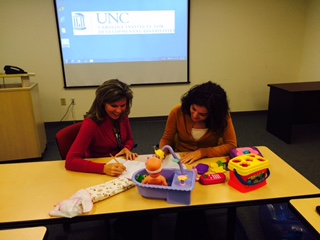North Carolina State Implementation Grant Provides Intensive Autism Diagnostic Training to Part C Interdisciplinary Teams
December 18, 2014

|
The overarching goals of the North Carolina ASD State Implementation Grant (NC SIG) are to Increase the number of children with ASD who are identified by 24 months of age; increase the number of children with ASD who receive their first interdisciplinary diagnostic evaluation by 36 months of age; and increase the number of children identified with ASD who are enrolled in early intervention services by 48 months of age or younger. As such, the NC SIG, in partnership with the NC UCEDD/LEND Programs, sponsored two 2-day training workshops this year on autism assessment, specifically the clinical use of the Autism Diagnostic Observation Schedule, Second Edition (ADOS-2) for interdisciplinary early intervention teams in North Carolina and clinical fellows from the North Carolina Leadership Education in Neurodevelopmental and Related Disabilities (NC-LEND) program. The workshops were hosted by the Carolina Institute for Developmental Disabilities (CIDD) and taught by Pamela DiLavore, Ph.D., co-author of the original ADOS, Assistant Director of the Chapel Hill TEACCH® Center, and collaborator on the NC SIG.
The ADOS-2 workshops were developed in collaboration with the NC Infant-Toddler Program (Part C) and targeted interdisciplinary personnel from the state-funded Children's Developmental Services Agencies (CDSA). Over 60 professionals and graduate student clinicians attended, including psychologists, nurses, speech-language pathologists, occupational therapists and early special educators. Prior to the workshop, the majority of participants reported that they had never been involved with ADOS-2 administration, nor did they feel entirely comfortable making autism diagnoses in very young children. As a group, however, they did express a desire to learn more about evidence-based assessment in children under 3 years of age and to begin to implement the ADOS-2 as part of their diagnostic practice. Following the workshop, nearly all participants stated that the information provided was pertinent to their day-to-day clinical practice and could be incorporated into their current assessment batteries. As a follow up, participants have reported increased use of and confidence with the ADOS-2 in their interdisciplinary diagnostic teamwork, and have noted a clear shift in their use of evidence-based tools for autism diagnosis. To further assist with implementation into practice, the NC SIG faculty and Dr. DiLavore will continue to provide technical assistance through email, video trainings, and phone conferencing over the next year.
In summary, as the CDSAs are the entry point for early intervention services in North Carolina and the primary agency serving children birth to three years, this training will increase the capacity of professionals available to conduct evidence-based interdisciplinary diagnostic evaluations of young children with or at-risk for autism spectrum disorder (ASD) across the state. In addition, the use of evidence-based assessments will provide opportunities for earlier diagnosis, earlier intervention, and improved developmental surveillance, particularly as children with or at-risk for ASD transition into the public school setting.
The NC SIG is a collaboration of the University of North Carolina at Chapel Hill Department of Allied Health Sciences (UNC DAHS), the CIDD (NC-LEND and UCEDD), and the Autism Alliance of North Carolina, in conjunction with university partners (Chapel Hill TEACCH® Center, Frank Porter Graham Child Development Institute, UNC CH Schools of Public Health and Social Work, the Sheps Center for Health Services Research) and state agencies (Autism Society of NC, NC Pediatrics Society, The NC Academy of Family Physicians, NC Department of Public Health Early Intervention Branch, NC Department of Public Health Women's and Children's Health Branch).
The NC SIG is funded by the Association of Maternal and Child Health Programs (H6MMC26248), and directed by Stephen Hooper, PhD, Associate Dean and Chair of the UNC DAHS, and Rebecca Edmondson Pretzel, PhD, Associate Director of the CIDD.
For more information on the NC SIG, please see http://uncnews.unc.edu/2014/01/13/unc-launch-unprecedented-collaboration-improve-services-young-children-autism-families/







